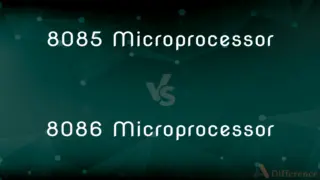Active Filter vs. Passive Filter — What's the Difference?
By Tayyaba Rehman — Published on January 28, 2024
Active Filters use external power and can amplify signals, while Passive Filters don't need external power but can't amplify signals, relying on resistors, capacitors, and inductors.

Difference Between Active Filter and Passive Filter
Table of Contents
ADVERTISEMENT
Key Differences
Active Filters are electronic filters that use active components like transistors and operational amplifiers, along with resistors and capacitors, to filter a signal. They require an external power source for their operation. Passive Filters, in contrast, do not use active components and are built using only resistors, capacitors, and inductors. They do not require an external power source and operate passively on the input signal.
One key advantage of Active Filters is their ability to provide signal gain, meaning they can amplify the filtered signal. This is not possible with Passive Filters, which can only attenuate the signal. Active Filters are also better at providing higher selectivity and can maintain constant bandwidth over a range of frequencies.
In terms of design and complexity, Active Filters are generally more complex and costly than Passive Filters. However, they offer greater flexibility in tuning and modifying the filter characteristics. Passive Filters, being simpler, are easier to design and more cost-effective but offer less flexibility.
Active Filters are less susceptible to load impedance variations, which means their performance is more consistent regardless of the connected load. Conversely, the performance of Passive Filters can be greatly affected by load variations, leading to a change in their filtering characteristics.
Finally, in terms of frequency range, Active Filters are typically used for lower frequency applications, as they become unstable at high frequencies. Passive Filters, on the other hand, are suitable for both low and high-frequency applications, making them versatile in a broader range of scenarios.
ADVERTISEMENT
Comparison Chart
Components
Uses active components like transistors and op-amps
Uses passive components: resistors, capacitors, inductors
Power Requirement
Requires external power source
Does not require external power
Signal Gain
Can amplify signals
Cannot amplify, only attenuates signals
Design Complexity
More complex and flexible
Simpler and less flexible
Frequency Range
Suitable for lower frequencies
Suitable for both low and high frequencies
Compare with Definitions
Active Filter
Uses active components and requires external power.
The active filter in the circuit provides both filtering and signal amplification.
Passive Filter
Built with resistors, capacitors, and inductors only.
The passive filter in the radio uses a simple LC circuit.
Active Filter
Offers higher selectivity and constant bandwidth.
The active filter maintains a consistent bandwidth across frequencies.
Passive Filter
Can only attenuate signals.
The passive filter effectively reduced noise without amplifying the signal.
Active Filter
Capable of signal amplification.
We used an active filter to not only filter but also boost the signal.
Passive Filter
Suitable for both low and high-frequency applications.
The passive filter was perfect for this application due to its wide frequency range.
Active Filter
Suitable for lower frequency applications.
For this low-frequency signal, an active filter was the ideal choice.
Passive Filter
Simpler and more cost-effective than active filters.
For cost-effective filtering, a passive filter was used in the device.
Active Filter
More complex and flexible in design.
Designing the active filter required careful consideration of component selection.
Passive Filter
Does not require external power.
We chose a passive filter for its simplicity and no need for power.
Common Curiosities
What differentiates an active filter from a passive filter?
Active filters use active components and require power; passive filters don’t.
Which filter is more complex to design?
Active filters are generally more complex.
Do passive filters require external power?
No, they operate without external power.
What components are used in active filters?
Transistors, operational amplifiers, resistors, and capacitors.
What are the components of a passive filter?
Resistors, capacitors, and inductors.
Do active filters offer better selectivity than passive filters?
Yes, they typically provide higher selectivity.
Can active filters amplify signals?
Yes, they can provide signal gain.
Are passive filters good for high-frequency applications?
Yes, they can be used for both low and high frequencies.
Can an active filter be used for high-frequency filtering?
They are less suitable for high frequencies due to stability issues.
Which filter type is better for consistent bandwidth?
Active filters maintain more consistent bandwidth.
How do load variations affect passive filters?
Load variations can significantly impact their performance.
Are passive filters affected by power supply fluctuations?
No, as they don’t require an external power source.
Can passive filters amplify a signal?
No, they can only attenuate signals.
Are active filters costlier than passive filters?
Generally, yes, due to their complexity and components.
Is it easier to modify active filter characteristics?
Yes, active filters offer greater flexibility in tuning.
Share Your Discovery

Previous Comparison
8085 Microprocessor vs. 8086 Microprocessor
Next Comparison
Igneous Rocks vs. Sedimentary RocksAuthor Spotlight
Written by
Tayyaba RehmanTayyaba Rehman is a distinguished writer, currently serving as a primary contributor to askdifference.com. As a researcher in semantics and etymology, Tayyaba's passion for the complexity of languages and their distinctions has found a perfect home on the platform. Tayyaba delves into the intricacies of language, distinguishing between commonly confused words and phrases, thereby providing clarity for readers worldwide.














































